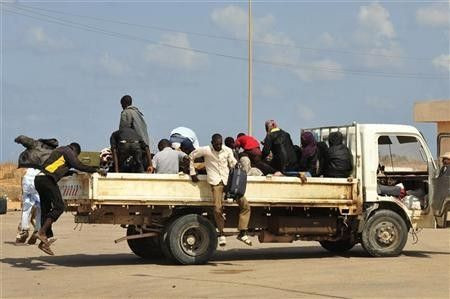Libyans Run Gauntlet of Bullets to Escape Sirte

Ali Ramadan's family were on the move for 10 days, dodging artillery fire and sleeping in the open, before they were finally able to get out of the besieged Libyan city of Sirte.
The city on the Mediterranean coast is the birth place of Muammar Gaddafi and is at the centre of a battle for control between diehard fighters loyal to Libya's deposed leader and forces with the National Transitional Council (NTC), the country's new rulers.
Ramadan and his family, and thousands of civilians like them, are caught in the middle and having to use all their determination and ingenuity to escape.
It was my sick mother and father who made me get out of Sirte, Ramadan said at a checkpoint on the eastern edge of the city.
Look at my father, he is a sick man, how can I take care of him like that, Ali said, pointing at his father's amputated leg and showing the scars on his side from a kidney operation.
It was early in the morning when Ali decided to leave Sirte with his two elderly parents, his sister, his daughters and their families.
Right after dawn is the best time for families to flee because then, residents who escaped say, the chance of being shot by snipers or hit by a rocket is not so great.
Ramadan and his extended family took whatever they could grab from their houses and drove off in a convoy of cars.
The only food they took with them was bread, dates, and water because, with supply routes into the city cut off, that was all that was available.
The distance to the edge of Sirte and safety is only a few kilometres, but the next part of the journey would take them 10 days.
Ramadan and his relatives described how, once they set out from their homes to reach safety, they would drive a short distance, then have to stop and seek shelter because the fighting was drawing closer to them.
When the bombardment started, we went to a ranch. We moved from one place to another. When the bombardment comes we go to another place. We kept moving from one place to another. We even slept on the beach, said Ramadan's sister, Umm Baki.
MALNUTRITION
They knew the journey out of Sirte would be risky, but she said they had no choice but to leave.
Power has been cut off in Sirte and shops have been shuttered for weeks. Many residents said they survived on whatever they stored before the siege as prices of foodstuffs soared. Clean water, medicine and petrol were scarce.
There was a lot of bombardment, it scared the kids and we could not leave the house. We had little food, sometimes we ate dates, sometimes we made bread, that's all, said Umm Baki.
Look at the kids' faces, they had diarrhoea and were sick because of the water and lack of food, she said, while three of her children poked their tired faces from the car's window.
We could not find milk for my daughter, we gave her water and sugar. We got back from the hospital after they gave her medicine for malnutrition, she said, as her 13-month-old daughter slept on her lap.
Adel Mahdi Khalil made the journey out of Sirte six days ago with his wife and four children.
Every time we try to leave ... they (Gaddafi fighters) stop us and tell us there is fighting outside and we cannot go out now, he said near Sirte.
We lived in eight different places and left all our clothes and stuff in the car, so we are ready to jump in the car and leave immediately when the rebels arrive, he said.
He escaped, but his parents are still in the city, trapped in an area controlled by Gaddafi loyalists.
Every day I come here and ask if anyone saw them, but no one knows them. They are still inside and cannot leave, he said.
© Copyright Thomson Reuters 2024. All rights reserved.





















